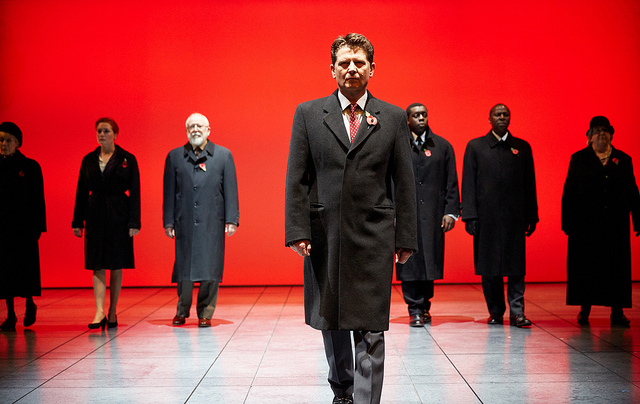@ Citizens Theatre, Glasgow, until Sat 4 Apr 2015
With the General Election looming as The Absence of War tours, it’s easy to see the deliberate timeliness of this revival of David Hare‘s 1993 hit, directed by Jeremy Herrin. The co-production between Headlong, Rose Theatre Kingston and Sheffield Theatres delivers a powerful comment on the two faces of politics (what a party’s ideals would have them achieve versus what they have to become in order to gain the power to achieve it), against a secondary context of history’s inevitable repetitiveness.
Surprised by a sudden call to the polls, Labour Party leader George Jones relishes the chance to go into battle as the opportunity arises to claim power for the underdog from the long-term ruling elite. But surrounded by yes-men who keep him strictly to script, he is unaware of the growing toxicity of his media image. Unable to speak from his heart or pursue his principles, he appears weak and fumbling under public scrutiny. And when the time comes to shake off the handcuffs imposed on him by his party, it’s too late. He has forgotten how to be the politician whose passion made him the party leader.
Researched in the backstage throes of a campaigning Labour Party during the 1992 election, Hare is able to give us an astute insight into the workings of a party mired in a history of electoral defeats. Very little has been changed for the 2015 revival and though no specific figures are represented amongst the characters, the issues are very recognisable. Can you maintain what you traditionally believe in as a party and still get elected if the opponents always win? Is the only way for Labour to defeat the Tories to become more like them? The party stereotypes seem to be the same now as they were then: you can vote for the economy or the NHS. In a time when no-one can afford a social conscience, how can Labour prove they will also be a safe pair of hands for our money?
It’s funny, with great use of staging and seamless, dynamic performance. The play promises to be particularly engaging to Scotland’s audiences who are arguably more politically active and aware now than they’ve ever been, especially at a time when a conventionally Labour-voting nation is considering whether it’s still worth taking this stance. Perhaps this will give us new perspective as we make our decisions in May.
